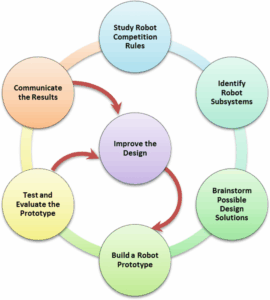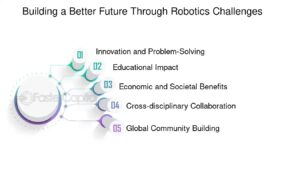In today’s fast-evolving technological world and age of rapid automation, AI and global shifts, preparing children for the future requires more than textbooks and tests. It calls for inculcating creativity, collaboration, resilience— the ability to work under pressure. STEM (Science, Technology, Engineering, and Mathematics) education, especially through a healthy dose of competitions, including but not limited to robotics and coding, offers children a powerful way to grow intellectually and emotionally. From the robotics arena to the coding lab, today’s competitions aren’t just about winning. They are about preparing children for the real world—with all its challenges, failures, and triumphs.
1. Robotics Competitions: More Than Just Engineering, Building Real-World Skills
When students engage in robotics challenges, they aren’t just learning how to build a robot to navigate a maze or programming a sensor to detect obstacles. They’re learning teamwork, persistence, critical thinking, and strategic problem-solving. Each robot they build represents hours of trial and error, decisions under pressure, and a constant push to improve. The real win? It’s not the trophy—it’s the transformation.
2. Failure as Feedback: Learning through Experience the Power of Resilience and Adaptability
Every competition, whether local or national, puts children face-to-face with failure early, safely and that’s a good thing. The motor doesn’t run, the sensor doesn’t detect, the code throws an error. In robotics, a failed sensor or a misaligned wheel can mean the difference between a working design and a flop. But with every setback comes an opportunity to analyze, adapt, and try again.
When children persist, they learn a lifelong lesson: adapt, improve, and try again. They learn to test ideas, recover from mistakes, and keep moving forward. This helps builds a resilient mindset that doesn’t fear mistakes but sees them as a part of learning, where setbacks are not seen as final but as feedback.. It’s a powerful lesson that will help them long after the robots are packed away.

3. The Emotional Landscape of a Robotics Arena
Just like a dojo or sports ring, STEM competitions also provide a controlled environment where children face off—not just against others, but against their own limitations. Entering a robotics arena sparks a mix of emotions—nervousness, excitement, pride, fear, and courage all in the same event. These emotional experiences in a controlled, encouraging environment help children develop emotional intelligence.
When a child loses a match or faces a robot malfunction, they learn how to deal with failure in a constructive way. And when they win, they learn humility, gratitude, and the value of effort. They learn to handle stress, support teammates, and even celebrate opponents. This self-awareness and empathy prepares them not just for exams, but for life.

4. How Competitions Support Long-Term Learning
Project-based learning model is a core part of modern STEM education. It keeps students engaged while strengthening their foundation in science and math—subjects often seen as “too hard” or “boring.” With the excitement of a challenge, STEM becomes a source of curiosity and confidence.
Unlike memorizing facts for a test, robotics competitions require deep, sustained learning. Students often spend weeks or months preparing, learning new coding languages, experimenting with mechanics, and solving real-world problems. As children are engaged in building the robots, coding and testing the robot themselves, under the guidance of a mentor, long term retention ability of concepts involved increases manifold.
I hear and I forget. ·
I see and I remember. ·
I do and I understand.
— Ancient Chinese Proverb
5. Discipline, Focus, and Team Spirit: Hidden Lessons
Much like martial arts, STEM competitions require discipline. Kids must manage their time, follow through on tasks, document their progress and commit to improvement. But unlike solo sports, robotics often demands collaborative success.
Members have to divide responsibilities in a team setting, where some take lead on coding, some handle construction and hardware assembly, and some others lead the testing phase. Their success depends not just on individual brilliance but on the collective effort of a team.
Through these shared responsibilities, they learn leadership, respect, and the art of collaboration—skills that every adult eventually needs in work and life. These aren’t just lessons for tech careers; they’re training for any path the child may choose.
6. The Real Trophy: Skills That Outlast the Medals
The robot may get dismantled. The medal may gather dust. But the impact of these experiences will endure. What remains are the core life skills: resilience, critical thinking, communication, and confidence. Children will walk away with more than certificates—they’ll carry forward grit, discipline, creativity, and emotional awareness.
In the end, robotics competitions are not about the robot. They are about the child—their growth, grit, and potential.

Conclusion: In a world where automation, AI, and constant change are the norm, giving children access to STEM and robotics challenges isn’t optional—it’s essential. Through competitions, they discover not just what they’re good at, but who they are becoming. In these competitions, children don’t just build robots—they build themselves. And that might just be the greatest invention of all.
At The STEM Makers, we offer Courses in Robotics(with access to customizable 6x8ft arena), Virtual Robotics, Programming, Mechanical Model Assembly, Mathematical Visualization, Electrical Circuits & long term training for national and international competitions, based on learner-centered approach where
1. Nothing is outside syllabus
2. Inculcating open/growth mindset, learning being adaptive
3. Learning to work in ambiguity
Kids learn autonomy, mastery & purpose in the process. Also the emphasis is on inculcating cooperative learning than competition, essential in the interdisciplinary workplaces of tomorrow where no single person can be expected to know everything.
The STEM Makers is a movement towards future-ready education in Vijayawada. By engaging children in robotics and hands-on STEM competitions, we intend to nurture the next generation of innovators, thinkers, and leaders.
References:
https://csweb.rice.edu/news/toward-robots-working-real-world-failure-makes-planning-better
